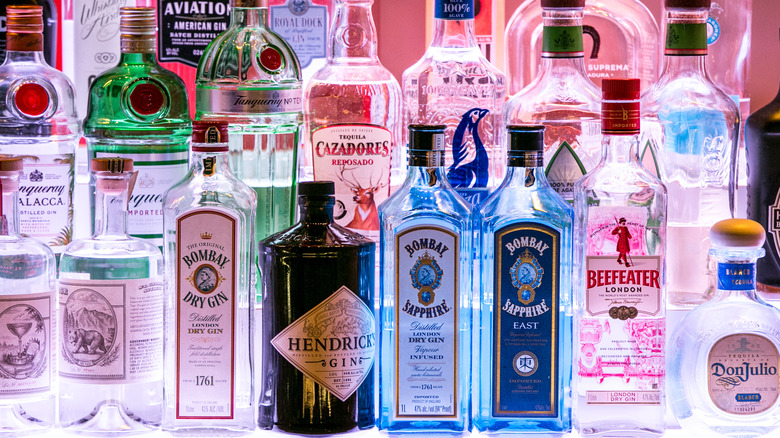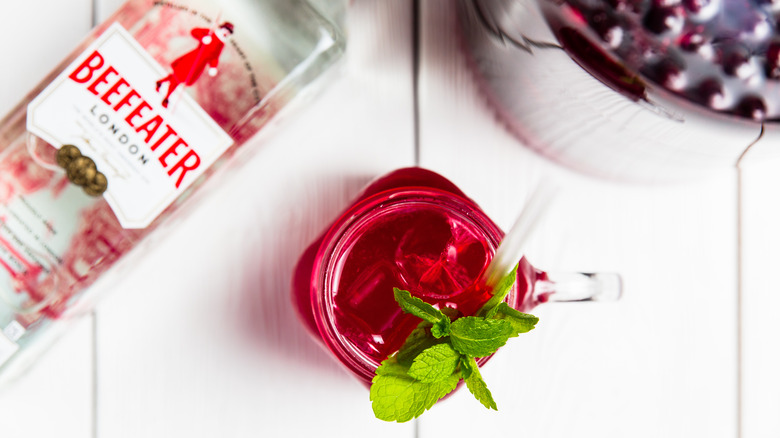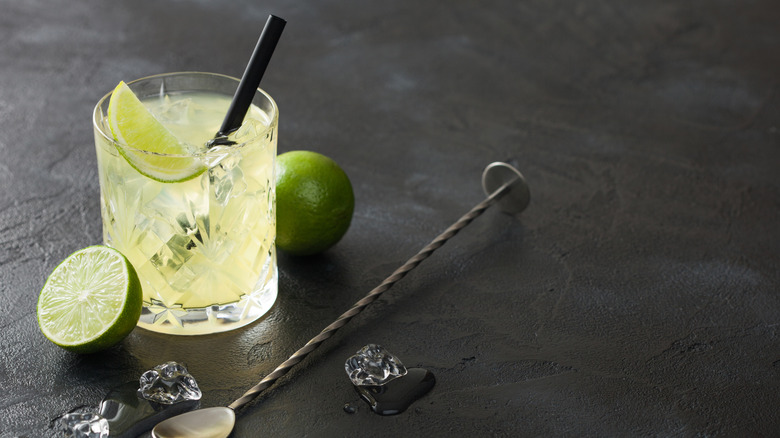The Difference Between Plymouth And London Dry Gin, Explained
Gin's a mainstay of the bar shelf, having sustained popularity among drinks for literal centuries. It's a spirit you either love or hate — the strong floral notes that come from the distillation process can turn folks off. Its botanical roots come from originally being created for medicinal purposes by a professor in the 17th century. And a good gin and tonic can still feel medicinal today.
The primary component in gin that separates it from other floral spirits is juniper berries. From the very first time it was distilled, juniper has been included in the mix and remains the basis for gin today. Just because it has a specific definition doesn't mean that gins have a narrow flavor profile. There are many varieties of gin from around the world, with different botanical blends and flavor notes. Two of the most well-known types are London dry gin and Plymouth gin. You've probably come across them before, but you may not know the difference between the two.
London Dry gin is juniper forward
The most well-known type of gin is London Dry gin. It has some big names amongst its ranks, like Beefeater and Tanqueray, and you've probably tried at least one. To be considered a London Dry gin, the botanicals must be infused during the multi-stage distillation process. Put another way: It's not a London Dry gin if botanicals have been added separately after distillation. The other big criterion is that it cannot have any artificial ingredients or colors. London Dry gin is the classic gin and is meant to be all-natural, with juniper forward and center.
While there are some pretty strict criteria when it comes to what's considered a London Dry gin, there is one criterion missing from the list: it doesn't have to be made in London. Unlike tequila or champagne, which are only produced in specific regions, London Dry is a label that strictly speaks to what is in the bottle, and not where the bottle is from.
Plymouth gin is lighter and more earthy
Plymouth gin is another big player on the market and is considered a classic in its own right. How is Plymouth gin different from its counterpart, London Dry gin? The truth is that, in many ways, they are strikingly similar. Plymouth gin is considered a type of London Dry gin, meeting all the same requirements. But while it is made with juniper berries, the flavor is a little softer and lighter in Plymouth than it is in other brands, like Beefeater or Bombay. Its botanicals are also earthier, which means the flavor is too. But the biggest difference is that Plymouth gin only comes from one place: a distillery in Plymouth, England, that has been distilling the spirit since 1793.
Plymouth's softer, earthier flavor lends itself well to cocktails, and is popular with people who are looking for something with a little less juniper. Chris Keller, a bartender at Osaka Ramen in Denver, talked to VinePair about gin's versatility, saying, "Gin is hard to pin down, perhaps more so than any other distillate, as the wide range of ingredients makes it variously suitable for different occasions." It's that flexibility that makes gin fun, and leaves room on the counter and in your cocktails for both Plymouth gin and all the other classic London Dry gins that are on the market.


